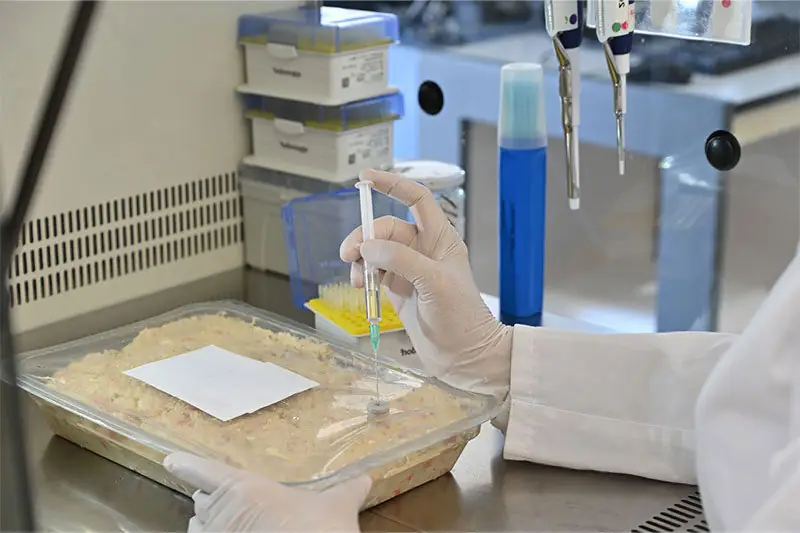Listeria Monocytogenes Detection in Cosmetic Creams
The presence of Listeria monocytogenes in cosmetic creams is a significant concern due to potential health risks. This bacterium can cause listeriosis, an infection that can be particularly dangerous for pregnant women, older adults, and those with weakened immune systems. Ensuring the microbiological safety of cosmetics is crucial not only from a regulatory standpoint but also to maintain consumer trust.
Microbiological safety testing in cosmetics involves identifying various pathogens such as Listeria monocytogenes, Pseudomonas aeruginosa, and others. Among these, the detection of Listeria monocytogenes is especially critical due to its ability to grow at refrigeration temperatures, which is common in many cosmetic storage conditions.
The primary challenge in detecting Listeria monocytogenes lies in the bacterium's low environmental concentration and its requirement for specific growth conditions. Traditional methods such as the Modified M-9 Media (M9) agar plating method can be time-consuming, with incubation times of up to 7 days. Modern techniques like PCR-based detection offer faster results but require high-quality laboratory facilities.
At Eurolab, we utilize advanced techniques including the Listeria monocytogenes Rapid Detection Kit (ISO 11290-1) and molecular methods such as polymerase chain reaction (PCR), which can provide results in less than 48 hours. Our approach ensures not only accuracy but also efficiency, aligning with the needs of quality managers, compliance officers, R&D engineers, and procurement teams.
The testing process begins with proper specimen preparation, ensuring that the cosmetic creams are homogenized to an appropriate consistency for sampling. Samples are then inoculated into enrichment broths followed by plating on selective media like M9 agar or direct PCR extraction. Positive cultures from these steps are further characterized using biochemical tests and serotyping.
Our laboratories use state-of-the-art equipment such as the QIAamp DNA Stool Mini Kit (Qiagen) for nucleic acid isolation and ABI 7500 Real-Time PCR System for quantification of Listeria monocytogenes in cosmetic creams. The results are reported according to international standards, including ISO 11290-1:2016.
The importance of microbiological safety testing cannot be overstated. It not only ensures compliance with regulations such as the EU Cosmetics Regulation (EC No 1223/2009) but also protects the reputation and market share of cosmetic brands.
Eurolab Advantages
At Eurolab, we pride ourselves on providing unparalleled expertise in microbiological safety testing for cosmetics. Our team of highly skilled microbiologists and chemists ensures that each sample is handled with the utmost care and precision. We employ advanced technologies and methodologies to deliver accurate results quickly.
- Accurate and Reliable Results: Our laboratories are equipped with the latest technology, ensuring precise and reliable detection of Listeria monocytogenes.
- Fast Turnaround Times: Leveraging modern techniques such as PCR, we can deliver results in less than 48 hours.
- Comprehensive Reporting: Our reports are detailed and comply with international standards, providing a clear understanding of the test outcomes.
- Regulatory Compliance: We ensure that all our services align with relevant regulations such as ISO 11290-1:2016 and EU Cosmetics Regulation (EC No 1223/2009).
- Expertise in All Aspects of Testing: Our team has extensive experience in all facets of microbiological safety testing, from sample preparation to final reporting.
We are committed to providing the highest level of service and support to our clients. Whether you require routine testing or one-off assessments, we can offer tailored solutions that meet your specific needs.
Environmental and Sustainability Contributions
The detection of Listeria monocytogenes in cosmetic creams is not only about compliance but also about contributing positively to the environment. By ensuring product safety, we reduce the likelihood of recalls and returns, which can have a significant impact on sustainability.
Our commitment to environmental responsibility extends beyond just detection. We adhere to strict waste management protocols and use energy-efficient equipment in our laboratories. Our services play a crucial role in maintaining consumer trust, which is vital for the long-term success of cosmetic brands.
The detection process itself contributes indirectly to sustainability by minimizing the risks associated with contaminated products reaching the market. This reduces the need for extensive recalls and reprocessing, which can consume considerable resources and energy.
Use Cases and Application Examples
| Use Case | Description |
|---|---|
| Routine Quality Control | Daily or weekly testing of cosmetic creams to ensure compliance with microbiological safety standards. |
| Batch Release Testing | Testing each batch of cosmetic creams before release to the market for contamination risks. |
| New Product Introduction | Comprehensive testing on new formulations to detect potential contaminants early in development. |
| Post-Market Surveillance | Ongoing monitoring of products already on the market to ensure ongoing safety and compliance. |
| Supplier Audits | Evaluating suppliers' production processes for adherence to microbiological safety standards. |
| Research and Development | Supporting R&D teams in developing new products that meet strict microbiological safety criteria. |
The detection of Listeria monocytogenes is a critical step in the quality assurance process, ensuring that cosmetic creams are safe for consumer use. This testing can be integrated into various stages of production and post-market surveillance to maintain high standards.





